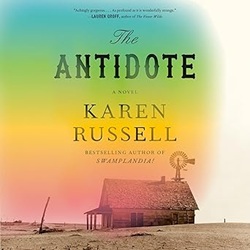
 The Antidote
The AntidoteReview posted July 4, 2025.
Books on Tape, 2025. 16 hours, 56 minutes.
Review written June 22, 2025, from a library eaudiobook.
Starred Review
2025 Sonderbooks Stand-out:
#3 Speculative Fiction
The Antidote is a historical novel of the Dust Bowl, woven throughout with magical realism. When I began the book, I wasn't sure I liked it, and the pace is literary and more slow-moving than the young adult and children's books I often read. But by the last several hours - well, let's just say that I stayed up until 3 am and finished a jigsaw puzzle to also finish this book. (Would I have stayed up to finish the jigsaw puzzle anyway? Maybe. But wanting to finish this audiobook meant I didn't even try to resist.)
The "Antidote" of the title is a person. She's a prairie witch, and that's the name she uses for customers. She's a vault for things you want to forget, memories that trouble you or that you want to stop thinking about for a time. The Antidote goes into a trance and the customer talks into her ear trumpet and the memories get transferred to her to carry. The customer doesn't remember what they confided, and the Antidote never heard it, but they can come back at any time, read their deposit slip backwards, and this time the transfer will go the other way, giving the memories back to the customer.
But the book opens on Black Sunday, the day an enormous dust storm went through Nebraska. On the same day, the Antidote went bankrupt. She can feel in her body that all the deposits were lost. What will she do when the customers fleeing the dry prairie want their deposits back?
There are other characters we follow. Harp Oletsky is a farmer whose wheat crop was miraculously spared. Even the scarecrow survived intact! He starts seeing lights coming from the land.
Harp's niece, Asphodel, is living with him after her mother was found dead in a ditch. She tries to escape her nightmares about her mother's body by playing basketball. But the folks supporting their team one by one are leaving Nebraska. And Asphodel wants to make some money by working for the Antidote.
Then there's a government photographer. She's a Black lady traveling alone. She tries to follow the instructions for the pictures the government wants to support the New Deal - but then her camera reveals images that she didn't see when she took the pictures.
And through all of this, we learn about life on the prairie and the hard things that happen there - things people are willing to pay to forget. For example, the Polish settlers don't want to face that they were offered free homesteads in order to secure land that belonged to the Pawnee people. And in fact, the Pawnee people are being treated exactly the way the Polish people were treated in Europe.
It also turns out that the no-good sheriff has been forcing the Antidote to receive deposits in order to hide evidence. And that comes to a head when the Lucky Rabbit's Foot Killer - who supposedly killed Asphodel's mother - has a botched execution on Black Sunday when the electric chair malfunctions. The election is coming up, and the sheriff intends to win on his record, never mind what is really the truth behind the murders.
And it's all wound together in a way that winds itself into your heart. I have to admit it got me thinking uncomfortable thoughts about my homesteading ancestors in a way I never faced before. The motto of the prairie in this book is "Better you than me." And the book shows up the problems with that motto - and how deeply it's embedded in the heart of America. Powerful stuff, and an engrossing read (once you get started).
